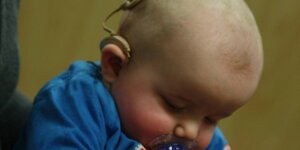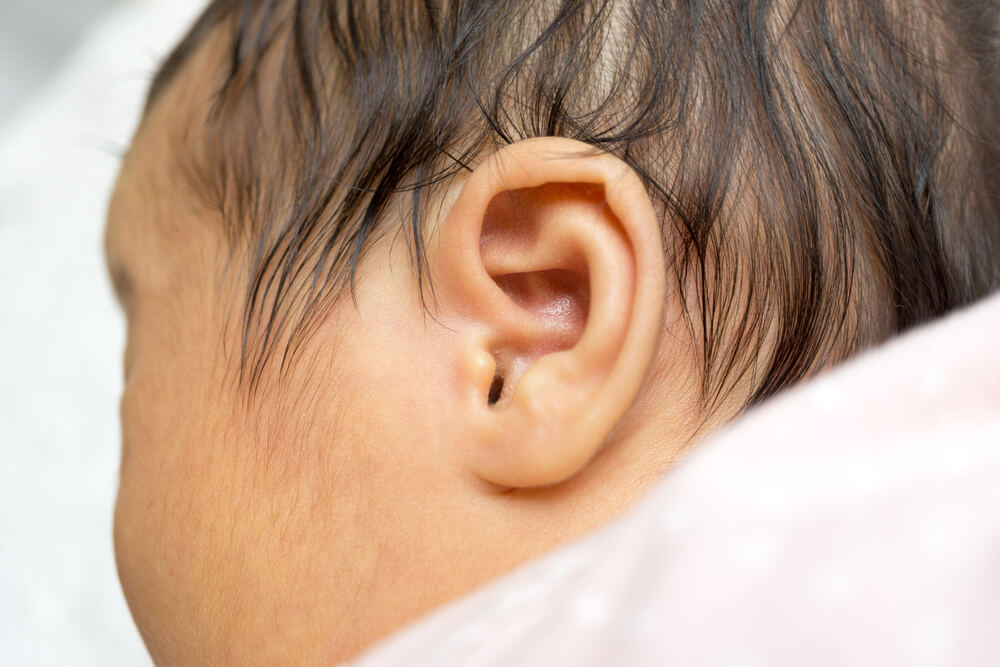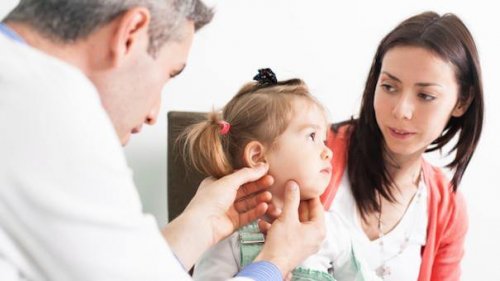Deafness in Babies: Everything You Need to Know

Deafness is a hearing deficit. Sometimes, it affects people from birth and other times it starts affecting people progressively over time. If a professional doesn’t diagnose deafness in babies in time, it can lead to problems with their development. We’ll tell you everything you need to know about this condition below.
What is deafness?
Deafness is the common name for hearing impairment. It means that people who are deaf have difficulty hearing. It’s also known as hearing loss. This can occur in varying degrees. For example, it may be possible to hear most things, only certain sounds, or you may not be able to hear anything at all. It can also affect only one ear or both.
In addition, deafness can start at birth or develop over time. When it comes to deafness in babies, the most common causes are family history, the mother taking certain medications during pregnancy, the mother having an intrauterine infection, or the baby being premature.

The most common causes of deafness during development are: otitis (ear infection), trauma to the eardrum or some infections, like meningitis.
Read also: Common Types of Ear Infections in Children
Why is it important to diagnose deafness in babies early?
Hearing plays a very important role in the correct development of language and communication. If a baby is born with hearing loss, and a professional doesn’t diagnose it early, it can have serious consequences for their development. For example, it can affect language learning, communication, and emotional and affective development.
If a doctor doesn’t diagnose your baby at birth, there are certain signs that you can look for in your child that should tell you something is wrong with their hearing. These signs differ depending on the baby’s age. Some of them are:
- 6 months: the baby isn’t making sounds or babbling.
- 15 months: the baby doesn’t recognize or react to their name.
- 2 years: the toddler doesn’t imitate words.
- 3 years: the toddler doesn’t say any words or phrases.
How do professionals diagnose deafness in babies?
In some countries, the doctor will do some hearing tests before the newborn baby even leaves the hospital. Generally, they’ll do this after the first 24 hours of life. If they don’t do these tests at the hospital right away, they’ll ask the parents to bring the baby in within a few days to do it.
There are two different tests that can diagnose deafness in babies. Both are totally harmless and painless. The two tests are the oto-acoustic emission test and the auditory potentials test. For both tests, they’ll stimulate the ear. With the oto-acoustic emissions test, they’ll collect the cochlea’s response to stimulation. As for the potentials test, they’ll collect the signals that the brain emits.

Keep reading: The Classification of Hearing Loss in Children
Conclusion
Your baby will usually be screened for deafness at birth. However, since this is such an important matter in terms of child development, you should continue to check their hearing. Your child’s pediatrician will also check their hearing at their annual check-ups. If you notice any signs of hearing issues, you should see a specialist right away.
Deafness is a hearing deficit. Sometimes, it affects people from birth and other times it starts affecting people progressively over time. If a professional doesn’t diagnose deafness in babies in time, it can lead to problems with their development. We’ll tell you everything you need to know about this condition below.
What is deafness?
Deafness is the common name for hearing impairment. It means that people who are deaf have difficulty hearing. It’s also known as hearing loss. This can occur in varying degrees. For example, it may be possible to hear most things, only certain sounds, or you may not be able to hear anything at all. It can also affect only one ear or both.
In addition, deafness can start at birth or develop over time. When it comes to deafness in babies, the most common causes are family history, the mother taking certain medications during pregnancy, the mother having an intrauterine infection, or the baby being premature.

The most common causes of deafness during development are: otitis (ear infection), trauma to the eardrum or some infections, like meningitis.
Read also: Common Types of Ear Infections in Children
Why is it important to diagnose deafness in babies early?
Hearing plays a very important role in the correct development of language and communication. If a baby is born with hearing loss, and a professional doesn’t diagnose it early, it can have serious consequences for their development. For example, it can affect language learning, communication, and emotional and affective development.
If a doctor doesn’t diagnose your baby at birth, there are certain signs that you can look for in your child that should tell you something is wrong with their hearing. These signs differ depending on the baby’s age. Some of them are:
- 6 months: the baby isn’t making sounds or babbling.
- 15 months: the baby doesn’t recognize or react to their name.
- 2 years: the toddler doesn’t imitate words.
- 3 years: the toddler doesn’t say any words or phrases.
How do professionals diagnose deafness in babies?
In some countries, the doctor will do some hearing tests before the newborn baby even leaves the hospital. Generally, they’ll do this after the first 24 hours of life. If they don’t do these tests at the hospital right away, they’ll ask the parents to bring the baby in within a few days to do it.
There are two different tests that can diagnose deafness in babies. Both are totally harmless and painless. The two tests are the oto-acoustic emission test and the auditory potentials test. For both tests, they’ll stimulate the ear. With the oto-acoustic emissions test, they’ll collect the cochlea’s response to stimulation. As for the potentials test, they’ll collect the signals that the brain emits.

Keep reading: The Classification of Hearing Loss in Children
Conclusion
Your baby will usually be screened for deafness at birth. However, since this is such an important matter in terms of child development, you should continue to check their hearing. Your child’s pediatrician will also check their hearing at their annual check-ups. If you notice any signs of hearing issues, you should see a specialist right away.
All cited sources were thoroughly reviewed by our team to ensure their quality, reliability, currency, and validity. The bibliography of this article was considered reliable and of academic or scientific accuracy.
- De Filosofía F, Letras Y, De Cádiz U. Problemas en la adquisición del lenguaje en niños con hipoacusia de nacimiento. Estudio de un caso práctico. 2016 Jul.
- Repositorio Universidad de Guayaquil: Detección precoz de hipoacusia en recién nacidos mediante tamizaje auditivo [Internet]. [cited 2020 Jun 10]. Available from: http://repositorio.ug.edu.ec/handle/redug/42903
- Spanish Multimedia Encyclopedia – TriHealth: Discover the Power of Unity – Hipoacusia – bebés – TriHealth: Discover the Power of Unity [Internet]. [cited 2020 Jun 10]. Available from: http://trihealth.adam.com/content.aspx?productId=118&pid=5&gid=007322&wrapper=no
This text is provided for informational purposes only and does not replace consultation with a professional. If in doubt, consult your specialist.








